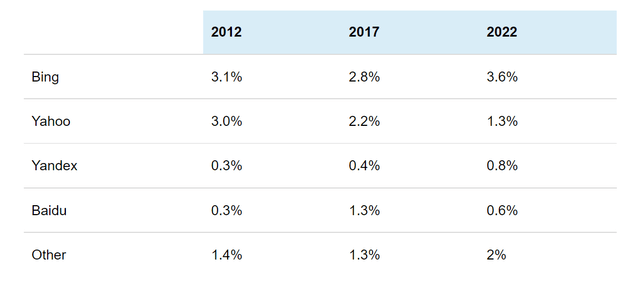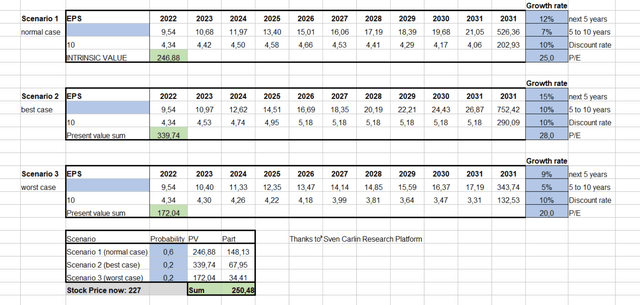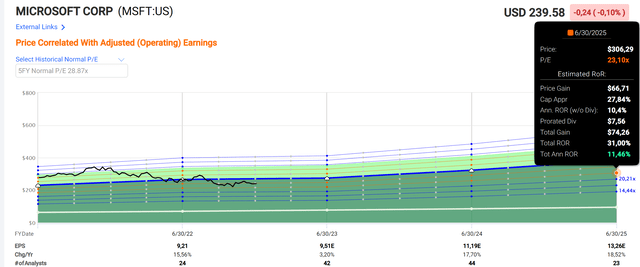Microsoft: Bing And ChatGPT Might Work Together, This Could Be Revolutionary
Summary:
- Microsoft has managed to secure a license over the code behind GPT, making it possible for only Microsoft to integrate it into products.
- The combination of Bing and ChatGPT has the potential to revolutionize the search and AI chat industries.
- From an investment point of view, this is like another positive potential for the company, although even before that, the prospects were already good.
Kimberly White/Getty Images Entertainment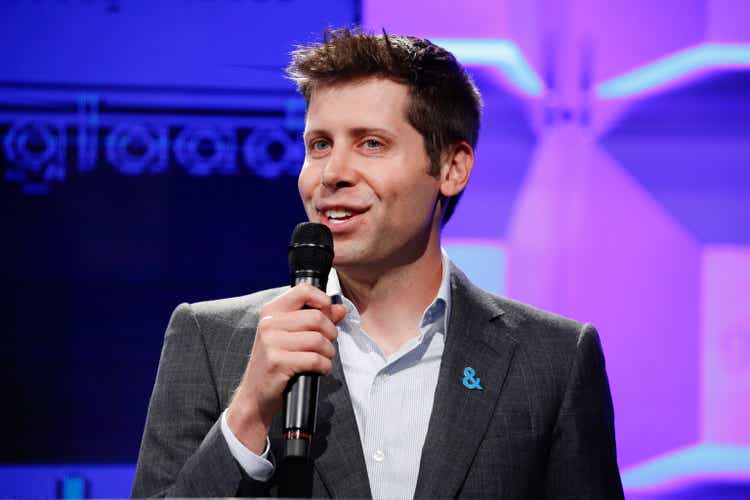
Introduction
The combination of Bing and ChatGPT has the potential to revolutionize the search and AI chat industries. Bing, a search engine developed by Microsoft (NASDAQ:MSFT), has been a popular alternative to Google since its launch in 2009. ChatGPT, on the other hand, is an AI chatbot developed by OpenAI that uses advanced natural language processing (NLP) capabilities to engage in human-like conversation. The merger of these two technologies could bring together the search and AI chat capabilities of Bing and ChatGPT, creating a powerful tool for users. With the ability to search the web and engage in conversation with an AI all in one place, the combination could greatly simplify and enhance the online experience for users. The potential impact of this combination on the tech industry is significant.
How Microsoft and OpenAI have worked together in the past
Microsoft and OpenAI have collaborated on several projects and initiatives in the past. For example, in 2019, Microsoft announced that it was investing $1 billion in OpenAI to support the development of advanced AI technologies. Microsoft and OpenAI also collaborated on developing GPT-3 (Generative Pre-trained Transformer 3), the very model now being used in ChatGPT and causing astonishment worldwide. In addition, there is a service to link the GPT language models with Azure’s enterprise capabilities. This allows OpenAI to leverage Azure’s scale and capabilities to support its AI work.
Also, a few months ago, in late 2022, there were reports of further funding payments from Microsoft and OpenAI. Overall, it’s easy to see how both parties benefit from the collaboration. OpenAI gets access to funding, benefits from Microsoft’s talent and computing power, and has access to a lot of data that can enhance its systems even more. And Microsoft gets access to a language model that offers incredible possibilities, even though it is still in its infancy. Allegedly, Generative Pre-trained Transformer 4 is to be published as early as 2023, which will then have been trained with even more parameters.
It is only a matter of time before real-time information is also incorporated into the bot’s answers. Then, there are endless possibilities. Here is a simple example, and I think this would be just the tip of the iceberg because the following example is already almost possible except for real-time information.
The new Azure OpenAI Service will give customers access to OpenAI’s powerful natural language GPT-3 models – with the security, reliability and enterprise capabilities of Microsoft Azure. Azure OpenAI Service can help developers working for a sports franchise create a new app by converting language to software code, then reason over transcripts of live television commentary to offer game summaries for the app and also generate ideas for blog posts and other written content for fans.
Source: blogs.microsoft.com
Overall, little public attention has been given to the fact that Microsoft has managed to secure a license over the code behind GPT, making it possible for only Microsoft to integrate it into products.
Through a partnership with OpenAI that aims to accelerate breakthroughs in AI – from jointly developing the first supercomputer on Azure that is powerful enough to meet the demands of very large AI models to testing and commercializing new AI technologies – Microsoft has a license to the code behind the GPT-3 model that allows it to integrate the technology directly into its products.
Source: blogs.microsoft.com
Given these past collaborations, the news that both companies are working on a ChatGPT-powered Bing to challenge Google is not surprising. It seems more like a logical next step. This also eliminates the question of monetizing ChatGPT. Because this would not be necessary directly in such a context but would arise indirectly via improved Microsoft products and, thus, probably higher market shares. OpenAI then has the luxury of not dealing with these issues, but can concentrate on improving its AI.
This could increase the market share of Bing
A few months ago, I dedicated an article to whether Google (GOOG) (GOOGL) has reached its peak. I noted that Google has been losing market share on desktop PCs for years and that Bing has been gaining market share, especially in recent years (and especially in the US).
The figures below are the worldwide figures for mobile and desktop combined. Bing’s market share is much higher in the US at over 7%.
So Bing is already gaining market share, while Google is already losing some. However, Google’s position on mobile is still firm. If Microsoft integrates ChatGPT well into its products, that could be a big argument for many people to switch. Probably we would then witness an attack on Google’s dominant mobile position as well. Perhaps with new Microsoft apps or even their own hardware again. At this point, it’s just speculation on my part as to what might happen. But this increased collaboration and integration seems certain, and is described by numerous blog articles on Microsoft’s website. Only a full integration into Bing or Windows does not exist yet. However, that seems to be only a matter of time.
The potential benefits for users
The potential benefits of the combination of both are numerous. For example, ChatGPT could be used to provide personalized search assistance to users of Bing. They could ask ChatGPT questions about their search queries, or get recommendations for specific search terms or categories. It could also provide additional information and context about search results, helping users find the most relevant information. It could provide detailed explanations of a product you see on a webshop much quicker and more conveniently than Google.
Probably the integration would not only stay on the browser level but gradually include other Microsoft products. For example, ChatGPT could provide help in Excel or Outlook. But also, in combination with Windows, there are endless possibilities. It could be used to automate and manage tasks within Windows. For example, users could schedule tasks, set reminders, or automate repetitive tasks much more quickly and without any code writing. Personally, I would like to use my keyboard less and sit back and talk to my computer. Of course, only if it understands my commands and executes them correctly. But why should I still write and click so much if that works?
Ultimately, it goes in a direction that Windows had previously pursued with Cortana. An integrated assistant that can do everything, understand human speech perfectly and answer just as well. So far, Cortana was nowhere near that level. But if this plan works with the help of ChatGPT, that would be a game changer from my point of view and an enormous challenge for Google’s core business.
Microsoft’s Valuation
On a 5-year view, the share trades comparatively cheaply, whereby Microsoft has been trading at higher average P/E ratios than the market for a long time. In my opinion, this is also justified due to the powerful market position, the relevance for the whole system, and the future prospects.
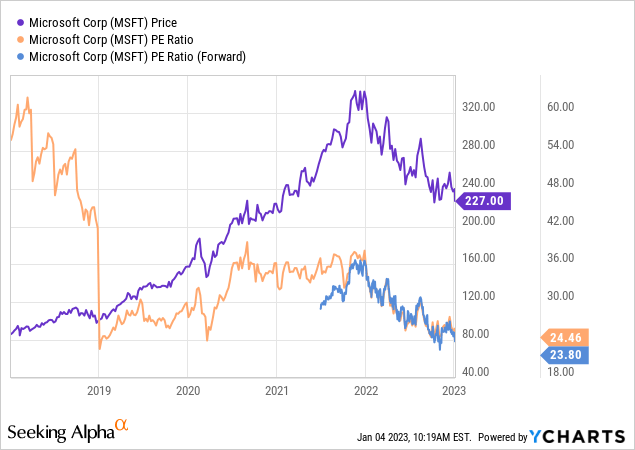
In my last article on Microsoft, I added a discounted cash flow analysis, the explanation of which I quote here. Otherwise, the figures are adjusted to the current share price.
I have created a detailed analysis with three different scenarios to determine the current fair value with a discounted cash flow model. The normal scenario is indicated as the most probable variant. Of course, one has to estimate the growth figures roughly. But the growth figures of scenario 1 (normal case) are already lower than the growth figures of the last year and the analysts’ estimates for the next two years. Furthermore, I put the growth numbers for all three scenarios not as far apart as for other companies. Another distinction between the three scenarios are different future P/E assumptions. According to this estimate, the stock is trading slightly below its fair value ($250 according to this calculation).
As the stock price has fallen recently, the expected return has become better and could be double-digit, even if the stock trades below its historical average P/E of 28. Given that there are now alternatives to equities again due to the interest rate increases, I expect that, at least for the next few years, equities will tend to trade below their historical average. But Microsoft is unlikely to fall to a P/E of 15, as it is a mix of tech and almost as systemically crucial as utilities. Certainly, not everyone will agree with the last point. I argue that because it’s an enormous power when most of the computers in the world run with their operating system and many governments and other companies’ data are on their cloud.
Profitability is very strong and has been improving for ten years. Therefore, Microsoft gets an A+ in the Seeking Alpha Quant rating for profitability. In addition, revenue and dividends have grown in double digits over the past five years, and analysts expect this to continue in the near future.
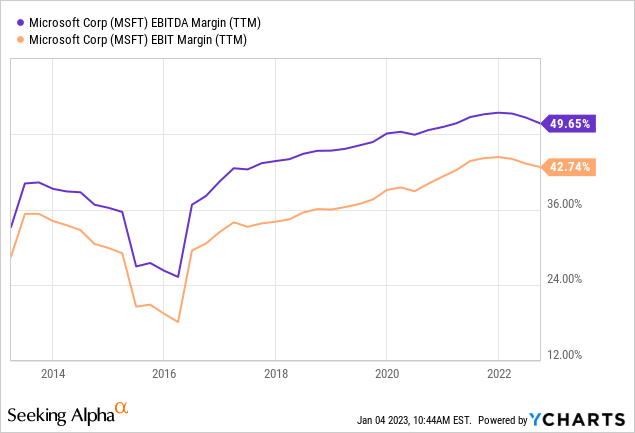
Conclusion
I’ve been playing around with ChatGPT a lot in the last few weeks, and I’m thrilled. Searching on YouTube also shows what creative applications others have already gotten. And that although the user interface could be better. Moreover, it neither uses real-time info nor is embedded in a larger system like Bing or Windows so far. If that happens and is well done, that has game-changer potential and especially disruption potential for Google. I also wrote about this just days ago. I argue that Google’s user interface needs to be updated and more user-friendly. And in fact, in some areas, I prefer to use ChatGPT over Google because the responses are excellent, fast, and straightforward.
From an investment point of view, it’s another positive potential for the company, although the prospects were already good. The company has enormous cash reserves, dominant market positions in several areas, and further expansion possibilities in the future, such as VR glasses, gaming, and now ChatGPT. But the real strength of the company comes when you combine everything. I am curious how all products interact in a few years. An AI may be able to program entire game worlds or adapt programs on Windows to the user – by simply describing in natural language what you want. We will see. At this price, Microsoft is a clear buy for me.
Disclosure: I/we have a beneficial long position in the shares of MSFT either through stock ownership, options, or other derivatives. I wrote this article myself, and it expresses my own opinions. I am not receiving compensation for it (other than from Seeking Alpha). I have no business relationship with any company whose stock is mentioned in this article.



